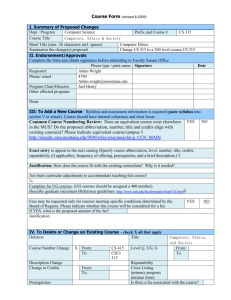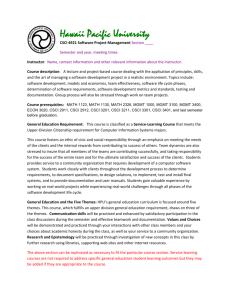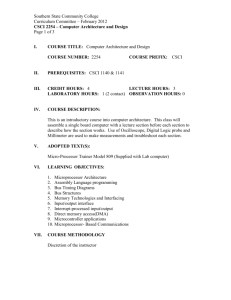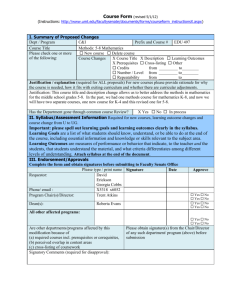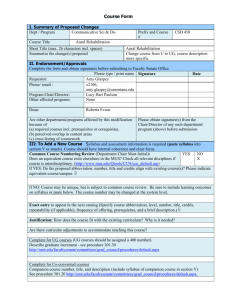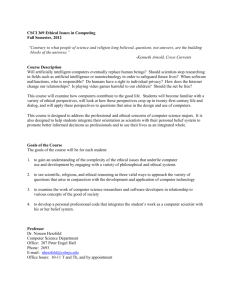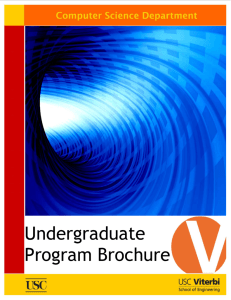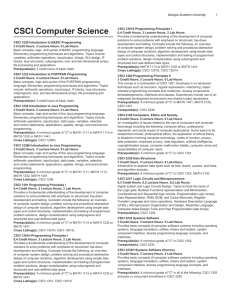III: To Add a New Course Syllabus and assessment information is
advertisement
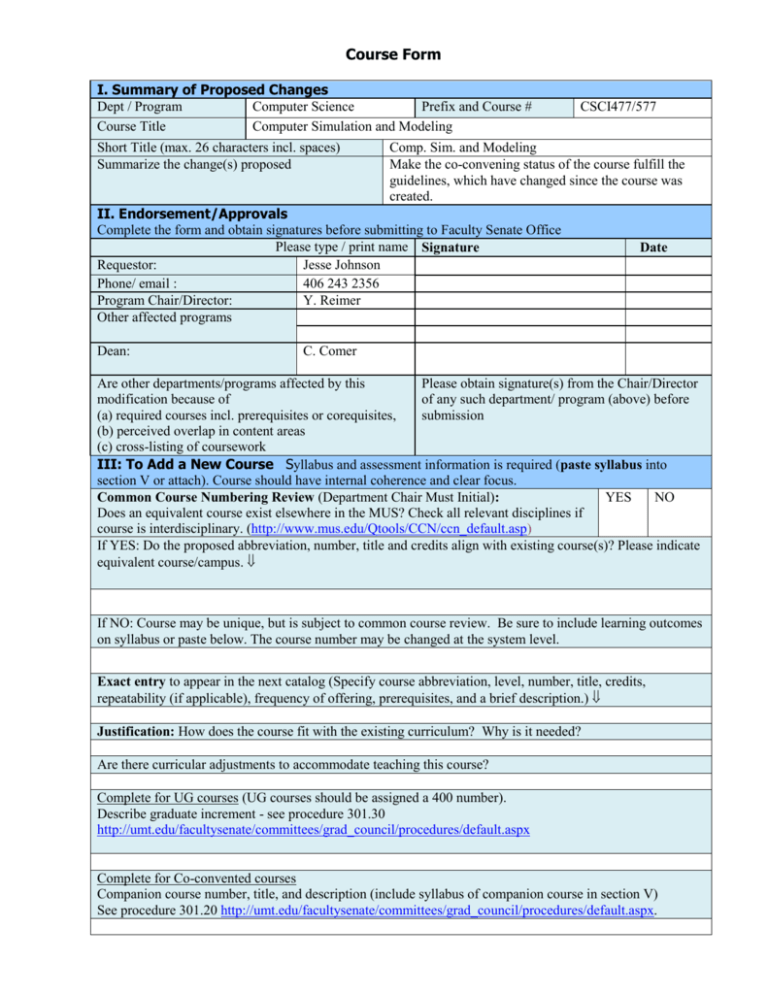
Course Form I. Summary of Proposed Changes Dept / Program Computer Science Prefix and Course # Course Title Computer Simulation and Modeling Short Title (max. 26 characters incl. spaces) Summarize the change(s) proposed CSCI477/577 Comp. Sim. and Modeling Make the co-convening status of the course fulfill the guidelines, which have changed since the course was created. II. Endorsement/Approvals Complete the form and obtain signatures before submitting to Faculty Senate Office Please type / print name Signature Requestor: Jesse Johnson Phone/ email : 406 243 2356 Program Chair/Director: Y. Reimer Other affected programs Dean: Date C. Comer Are other departments/programs affected by this Please obtain signature(s) from the Chair/Director modification because of of any such department/ program (above) before (a) required courses incl. prerequisites or corequisites, submission (b) perceived overlap in content areas (c) cross-listing of coursework III: To Add a New Course Syllabus and assessment information is required (paste syllabus into section V or attach). Course should have internal coherence and clear focus. Common Course Numbering Review (Department Chair Must Initial): YES NO Does an equivalent course exist elsewhere in the MUS? Check all relevant disciplines if course is interdisciplinary. (http://www.mus.edu/Qtools/CCN/ccn_default.asp) If YES: Do the proposed abbreviation, number, title and credits align with existing course(s)? Please indicate equivalent course/campus. If NO: Course may be unique, but is subject to common course review. Be sure to include learning outcomes on syllabus or paste below. The course number may be changed at the system level. Exact entry to appear in the next catalog (Specify course abbreviation, level, number, title, credits, repeatability (if applicable), frequency of offering, prerequisites, and a brief description.) Justification: How does the course fit with the existing curriculum? Why is it needed? Are there curricular adjustments to accommodate teaching this course? Complete for UG courses (UG courses should be assigned a 400 number). Describe graduate increment - see procedure 301.30 http://umt.edu/facultysenate/committees/grad_council/procedures/default.aspx Complete for Co-convented courses Companion course number, title, and description (include syllabus of companion course in section V) See procedure 301.20 http://umt.edu/facultysenate/committees/grad_council/procedures/default.aspx. New fees and changes to existing fees are only approved once each biennium by the Board of Regents. The coordination of fee submission is administered by Administration and Finance. Fees may be requested only for courses meeting specific conditions according to Policy 940.12.1 http://mus.edu/borpol/bor900/940-12-1.pdf . Please indicate whether this course will be considered for a fee. If YES, what is the proposed amount of the fee? Justification: YES NO IV. To Delete or Change an Existing Course – check X all that apply Deletion Title Course Number Change From: Level U, UG, G 477(U) From: Co-convened 577(C) To: To: Description Change Change in Credits From: To: Prerequisites 1. Current course information at it appears in catalog (http://www.umt.edu/catalog) Repeatability Cross Listing (primary program initiates form) Is there a fee associated with the course? 2. Full and exact entry (as proposed) CSCI 477 Prereq., M 172 (MATH 153), CSCI 135 (CS 132), or consent of instr. Matrix languages. ODE solving; Euler-Richardson, Runge-Kutta, PDE solving; finite differences, finite elements, multi-grid techniques. Discrete methods for solution, renormalization group method, critical phenomena. Emphasis on presentation of results and interactive programs. Credit not allowed for CSCI 577 (CS 577) and this course. CSCI 477(U) (coconvene with CSCI 577) Prereq., M 172 (MATH 153), CSCI 135 (CS 132), or consent of instr. Matrix languages. ODE solving; Euler-Richardson, Runge-Kutta, PDE solving; finite differences, finite elements, multi-grid techniques. Discrete methods for solution, renormalization group method, critical phenomena. Emphasis on presentation of results and interactive programs. Credit not allowed for CSCI 577 (CS 577) and this course. CSCI 577 Prereq., M 172 (MATH 153), CSCI 135 (CS 132), or consent of instr. Matrix languages. ODE solving; Euler-Richardson, Runge-Kutta, PDE solving; finite differences, finite elements, multi-grid techniques. Discrete methods for solution, renormalization group method, critical phenomena. Emphasis on presentation of results and interactive programs. Credit not allowed for CSCI 577 (CS 577) and this course. CSCI 577(C) (coconvene with CSCI 477) Prereq., M 172 (MATH 153), CSCI 135 (CS 132), or consent of instr. Matrix languages. ODE solving; Euler-Richardson, Runge-Kutta, PDE solving; finite differences, finite elements, multi-grid techniques. Discrete methods for solution, renormalization group method, critical phenomena. Emphasis on presentation of results and interactive programs. Conduct, document, and present graduate level research involving computer simulation methods. Credit not allowed for CSCI 477 (CS 477) and this course. 3. If cross-listed course: secondary program & course number 4. If co-convened course: companion course number, title, and description (include syllabus of companion course in section V) See procedure 301.20 http://umt.edu/facultysenate/committees/grad_council/procedures/default.aspx. CSCI 477 and 577 will be listed as co-convening. The altered catalog entries appear above. The syllabus for these classes establishes the differences between the two and is attached. 5. Is this a course with MUS Common Course Numbering? YES NO http://www.mus.edu/Qtools/CCN/ccn_default.asp If yes, please explain below whether this change will eliminate the course’s common course status. All Computer Science classes have moved to the common numbering scheme. The changes proposed here do not impact the status of these courses. 6. Graduate increment if level of course is changed to UG. Reference procedure 301.30: http://umt.edu/facultysenate/committees/ grad_council/procedures/default.aspx (syllabus required in section V) 7. Other programs affected by the change 8. Justification for proposed change Have you reviewed the graduate increment guidelines? Please check (X) space provided. Computer science has made use of coconvening courses for a number of years in order to enhance the offerings for our undergraduates that are in need of electives. This has been the only workable solution for a small department that hosts a graduate program. V. Syllabus/Assessment Information (must include learning outcomes) Required for new courses and course change from U to UG. Paste syllabus in field below or attach and send digital copy with form. Attached. VI Department Summary (Required if several forms are submitted) In a separate document list course number, title, and proposed change for all proposals. VII Copies and Electronic Submission. After approval, submit original, one copy, summary of proposals and electronic file to the Faculty Senate Office, UH 221, camie.foos@mso.umt.edu. Revised 8-23-11
